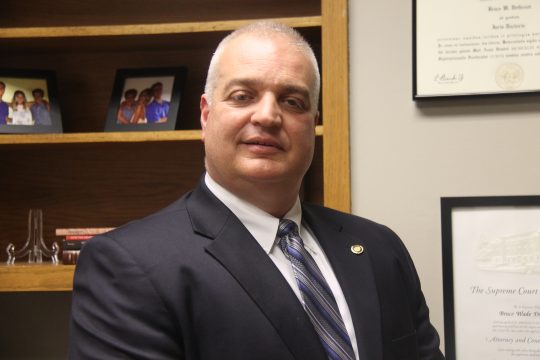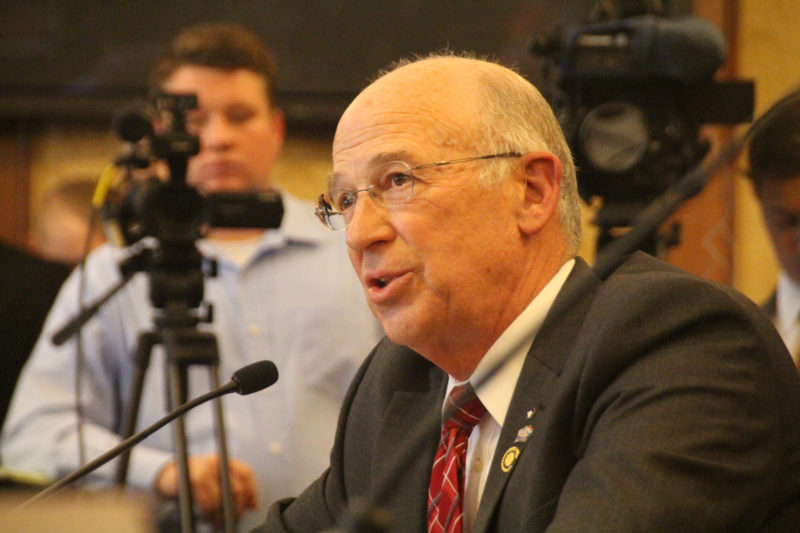JEFFERSON CITY, Mo. – Sen. Ed Emery’s collateral source rule change bill made it through the Senate in February and it finally received a hearing in the Special House Committee on Litigation Reform Monday afternoon.
But even while Republicans in both chambers have supported the tort reform measure, SB 31 could still be in jeopardy.
Emery’s bill would change the collateral source rule to emphasize medical costs remain medical costs. Under Missouri’s current system, both plaintiff and defense attorneys can submit to juries in special damages and injury cases. Plaintiffs usually submit the total amount of money a given procedure costs a hospital while defendants can present evidence of what a plaintiff has received from insurance companies, Medicaid, private discounts or any other kind of of payments. Juries then make a judgement anywhere in between those two amounts.
The new legislation would limit the evidence a jury can receive in special damages claims cases to what amount of money has been paid to satisfy the medical bills and what it costs, not factoring in what a hospital values the procedure to be.
Senate Republicans passed Emery’s bill easily 22-10, with only Sen. Rob Schaaf, R-St. Joseph, breaking party lines. However, the bill has been a highly contentious piece of legislation in the past. Last year, Sen. Scott Sifton, D-Affton, led a filibuster on the bill which lasted 13 hours. Ultimately, Emery’s bill last year could not overcome a veto from Democratic Gov. Jay Nixon.

Now, he fears the bill may not make it through the process to even reach the governor’s desk because of an amendment from Rep. Bruce DeGroot.
DeGroot attached an amendment to Rep. Joe Don McGaugh’s collateral source bill, which is now being carried by Emery in the Senate, that purposefully states evidence may not be presented if the amount billed has already been paid. DeGroot’s amendment, in Emery’s words, is “belt and suspenders” language that simply reiterates what the underlying bill is designed to do. If DeGroot’s amendment is adopted onto Emery’s bill, as it likely will be, it would have to go back to the Senate for final approval before going to Gov. Eric Greitens’ desk.
“I don’t think we can pass this bill twice in the Senate,” Emery testified at the committee hearing Monday, telling Rep. Mark Ellebracht, D-Liberty, that he did not support adding the amendment to the bill.
DeGroot, however, sees his bill as much more important than a mere reiteration. In an inquiry with Rachel Hill, who testified on behalf of the Missouri Hospital Association and the Missouri Organization of Defense Lawyers, DeGroot noted nothing in the underlying bill would have prevented extraneous bills from being submitted into evidence.
“Without the amendment, I think unfortunately you’re going to have both numbers coming in anyway,” Hill said in agreement.
Rep. Kevin Corlew believed judges could simply dismiss numbers not pertaining to the actual cost of damages during trial, but Hill noted judges did not always wield unlimited power to make those decisions.
Ellebracht said tongue-in-cheek he may vote for the amendment if it meant holding up the bill from becoming law.
“If the majority party can’t get this passed because we add an amendment that makes this thing unpassable, then at the end of session they’re going to have to look around with empty hands,” he said.
While numerous representatives of doctors, hospitals and industries testified in favor of the bill, the Missouri Association of Trial Attorneys stood alone in their opposition to the measure. Brian McCallister of the organization said “amendment or no amendment, this bill is bad for the working people of this state.
“What this bill does is take away from Missouri’s working men and women, benefits they should receive, and we’re giving it to a hospital, an insurance company, a railroad, all of the people who testified in favor of the bill,” he said.
An executive session on the bill, and the possible attachment of DeGroot’s amendment, will occur Thursday.














